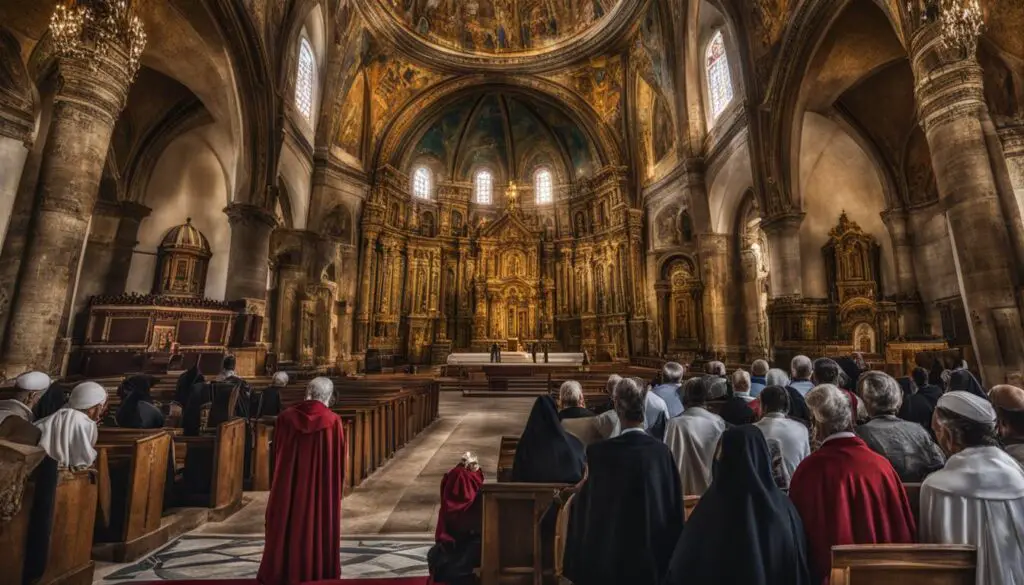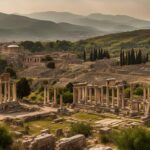The church in Thyatira is an important part of early Christian history, with a rich and intriguing story that sheds light on the challenges and triumphs of the early Christian community. This article will explore the origins and founders of the church, its key beliefs and doctrines, its historical significance, any denominational splits or schisms it may have faced, its leadership and governance structure, its worship practices, its contemporary influence, and any available statistics on its current world membership and percentage of world religions.
Key Takeaways:
- The church in Thyatira played a significant role in early Christianity and faced challenges related to false teachings and compromising with the surrounding pagan culture.
- While the specific origins and founders of the church are not well-documented, it is believed that the ministry of Lydia, a seller of purple fabrics, may have influenced its establishment.
- The church in Thyatira would have held to the core tenets of early Christianity, including belief in Jesus Christ as the Son of God and Savior, the authority of Scripture, and the importance of faith, love, and service.
- Despite its smaller size and influence compared to other churches, the church in Thyatira serves as a reminder of the importance of remaining faithful to Christ amidst cultural pressures and the need for discernment in dealing with false teachings.
- While there is no specific information regarding denominational splits or schisms in the church, it faced challenges related to false teachings and compromising behaviors, which may have led to internal divisions or disagreements among its members.
Origins and Founders of the Church in Thyatira
The church in Thyatira, mentioned in the book of Revelation, does not have clear documentation regarding its exact origins and founders. However, it is believed that the church may have been established through the ministry of Lydia, a converted follower of the apostle Paul. Lydia, a seller of purple fabrics from Thyatira, is mentioned in Acts 16:14-15. Her influence and the teachings she received from the early Christian community would have shaped the development of the church in Thyatira.
The church in Thyatira would have embraced the foundational teachings of early Christianity, but it also developed its own distinct identity and theological perspectives as it faced challenges and grew. While historical records do not provide specific details about the founders and initial leaders of the church, it is evident that the presence of the church in Thyatira played a significant role in the early Christian community.
Key Beliefs and Doctrines of the Church in Thyatira
The specific beliefs and doctrines of the church in Thyatira are not explicitly mentioned in historical records or biblical texts. However, as a Christian community, it would have likely adhered to core tenets such as the belief in Jesus Christ as the Son of God and Savior, the authority of Scripture, and the importance of faith, love, and service. The church may have also developed its own interpretations and practices based on the teachings and traditions passed down from the apostles and other church leaders.
Historical Significance of the Church in Thyatira
The church in Thyatira, although smaller and less influential compared to other churches, holds historical significance as it represents the struggles faced by the early Christian community. Its presence and perseverance in the face of challenges serve as a reminder of the importance of remaining faithful to Christ amidst cultural pressures. The experiences of the church in Thyatira shed light on the need for discernment in dealing with false teachings and the compromising influences of the surrounding culture.
Denominational Split or Schisms in the Church in Thyatira
There is no specific information available regarding significant denominational splits or schisms within the church in Thyatira. However, the church did face challenges related to false teachings and the tolerance of sinful behaviors within its community. These issues may have led to internal divisions or disagreements among its members, but the historical record does not provide specific details on these matters. The ability of the church to address and overcome these challenges would have played a significant role in its long-term stability and influence.
Key Beliefs and Doctrines of the Church in Thyatira
The church in Thyatira held to a set of key beliefs and doctrines that were consistent with early Christianity. While specific details are not available, we can infer from the broader teachings of the early church that the church in Thyatira would have shared these foundational beliefs.
First and foremost, the church in Thyatira would have believed in Jesus Christ as the Son of God and Savior. This belief in the divinity of Jesus was central to early Christian theology and is reflected in the writings of the apostles. The church would have also upheld the authority of Scripture, considering the Old and New Testaments as the inspired Word of God.
Faith, love, and service were also emphasized by early Christian communities, and it is likely that the church in Thyatira shared these values. Faith in Jesus as the means of salvation, love for God and one another, and service to those in need were essential components of Christian life and were often highlighted in the teachings of the apostles.
“Let love and faithfulness never leave you; bind them around your neck, write them on the tablet of your heart.” – Proverbs 3:3
The Importance of Discernment
In addition to these foundational beliefs, the church in Thyatira would have emphasized the need for discernment in the face of false teachings and compromising behaviors. The surrounding culture in Thyatira was known for its pagan practices, and the church would have faced pressure to conform to these practices.
It is likely that the church in Thyatira developed its own interpretations and practices based on the teachings and traditions passed down from the apostles and other church leaders. This emphasis on discernment and the need to distinguish between truth and falsehood would have been crucial in maintaining the integrity of the church’s beliefs and practices.
Table: Core Beliefs of the Church in Thyatira
| Belief | Scriptural Basis |
|---|---|
| Jesus Christ as the Son of God and Savior | John 3:16, 1 John 4:14 |
| Authority of Scripture | 2 Timothy 3:16-17 |
| Faith in Jesus for Salvation | Ephesians 2:8-9 |
| Love for God and Others | Matthew 22:37-39 |
| Service and Ministry | Matthew 25:35-40 |
Historical Significance of the Church in Thyatira
The church in Thyatira, although smaller and less prominent compared to other churches in Asia Minor, holds significant historical significance in the context of early Christianity. This biblical church played a crucial role in representing the struggles and challenges faced by the early Christian community in a pagan society.
Thyatira, a small city known for its manufacturing industries, provided a unique backdrop for the church’s formation and growth. The church’s presence in Thyatira serves as a reminder of the early Christian’s ability to thrive amidst cultural pressures and the need for discernment in dealing with false teachings.
“The perseverance of the church in Thyatira, despite the challenges it faced, demonstrates the unwavering dedication of early Christians in upholding their faith in Christ.”
This biblical church also serves as a testament to the universal struggles faced by the broader early Christian community. Its experiences with false teachings, compromise, and the quest for discernment continue to hold valuable lessons for Christians today.
Historical Significance of the Church in Thyatira
The church in Thyatira, although smaller and less prominent compared to other churches in Asia Minor, holds significant historical significance in the context of early Christianity. This biblical church played a crucial role in representing the struggles and challenges faced by the early Christian community in a pagan society.
Thyatira, a small city known for its manufacturing industries, provided a unique backdrop for the church’s formation and growth. The church’s presence in Thyatira serves as a reminder of the early Christian’s ability to thrive amidst cultural pressures and the need for discernment in dealing with false teachings.
“The perseverance of the church in Thyatira, despite the challenges it faced, demonstrates the unwavering dedication of early Christians in upholding their faith in Christ.”
This biblical church also serves as a testament to the universal struggles faced by the broader early Christian community. Its experiences with false teachings, compromise, and the quest for discernment continue to hold valuable lessons for Christians today.
| Church | Founders | Key Beliefs | Historical Significance |
|---|---|---|---|
| Thyatiran Church | Unknown | Belief in Jesus Christ as the Son of God and Savior, Authority of Scripture, Faith, Love, and Service | Represented struggles and challenges of the early Christian community in a pagan society |
Denominational Split or Schisms in the Church in Thyatira
While there is no specific information available regarding any significant denominational splits or schisms within the church in Thyatira, it is worth noting that the church faced challenges related to false teachings and compromising behaviors. These issues may have led to internal divisions or disagreements among its members. The church’s ability to address and overcome these challenges would have played a significant role in its long-term stability and influence.
“Beware of false prophets, who come to you in sheep’s clothing but inwardly are ravenous wolves.” – Matthew 7:15
Guided by the teachings of the apostle John, the church in Thyatira would have been aware of the dangers of false prophets and their potential to cause divisions within the community of believers. The leaders and members of the church would have been tasked with discerning truth from error and maintaining fidelity to the teachings of Jesus Christ.
In addressing the challenges posed by false teachings and compromising behaviors, the church in Thyatira would have relied on the guidance and wisdom of its appointed leaders or elders. These individuals would have played a crucial role in promoting unity, addressing disputes, and upholding the biblical truth within the church. Their leadership and governance would have been essential in navigating potential divisions and ensuring the spiritual wellbeing of the community.
| Challenges | Impact |
|---|---|
| False teachings and heresies | Potential for division and theological confusion |
| Compromise with pagan practices | Threat to the church’s witness and spiritual integrity |
Despite the potential for division and schisms, the church in Thyatira would have likely strived to maintain unity and uphold biblical truth. The leaders and members would have been encouraged to engage in open dialogue, study Scripture, and seek the guidance of the Holy Spirit in addressing differences and resolving conflicts. By doing so, the church in Thyatira would have endeavored to remain faithful to the teachings of Jesus Christ and avoid the destructive consequences of division.
Leadership and Governance of the Church in Thyatira
The leadership and governance structure of the church in Thyatira, although not extensively documented, can be inferred from the practices and teachings of the early Christian church. It is likely that the church had appointed leaders or elders who provided spiritual guidance, teaching, and oversight to the congregation. These leaders would have played a crucial role in addressing the challenges and concerns within the church, including the false teachings and compromising behaviors that the church faced. Their wisdom and faithfulness were essential for the success and growth of the church in Thyatira.
The leaders in the church would have been responsible for the overall spiritual direction of the congregation, ensuring the adherence to biblical truth and the preservation of sound doctrine. They would have overseen the administration of sacraments such as baptism and the Lord’s Supper, ensuring that they were conducted in accordance with the teachings of the early Christian church. Additionally, they would have provided pastoral care to the members of the church, supporting and guiding them in their faith journeys.
“The church in Thyatira serves as a reminder of the importance of strong leadership and governance within a Christian community. The leaders of the church were entrusted with the responsibility of safeguarding the truth and guiding the congregation in the midst of cultural pressures and false teachings. Their role extended beyond mere administration to the spiritual nourishment and growth of the believers.”
The leadership structure of the church in Thyatira demonstrates the need for competent and faithful leaders in the church today. Just as the leaders in Thyatira played a vital role in addressing the challenges and preserving the integrity of the faith, modern-day church leaders bear the responsibility of upholding biblical truth and shepherding the congregations they serve. The example of leadership in Thyatira reminds us of the importance of qualified and spiritually mature leaders who can guide and inspire the church towards faithful discipleship.

| Key Leaders | Role |
|---|---|
| Presbyters/Elders | Provided spiritual guidance and oversight |
| Pastors | Offered pastoral care and support to the congregation |
| Deacons | Assisted with practical and administrative tasks |
The table above highlights the key leaders in the church in Thyatira and their roles. It should be noted that the specific titles and organizational structure may have varied depending on the time and context of the church. Nevertheless, the presence of these leaders within the church provided stability, guidance, and spiritual nourishment to the members.
Worship Practices of the Church in Thyatira
The worship practices of the church in Thyatira would have centered around their faith in Jesus Christ and the teachings of the early Christian community. While specific details are not available, it can be inferred that their gatherings would have included elements such as prayer, Scripture reading, teaching, and fellowship. Singing of hymns and psalms, as was customary in early Christian worship, may have also been a part of their gatherings. The church in Thyatira may have celebrated the sacraments of the Lord’s Supper and baptism as important symbols of their faith.
Worship in the church would have been an essential part of their spiritual life, offering believers the opportunity to express their devotion to God and strengthen their faith through communal worship. These gatherings would have provided a sense of unity and fellowship among the members, allowing them to encourage and support one another in their Christian journey.
The worship practices of the church in Thyatira would have reflected the broader traditions and customs of the early Christian church, while also incorporating unique elements that were specific to their local community. Through their worship, the church in Thyatira would have sought to honor and glorify God, grow in their understanding of the faith, and foster a deep sense of spiritual connection with one another.
Table: Examples of Possible Worship Practices
| Element of Worship | Description |
|---|---|
| Prayer | Believers coming together to communicate with God, seeking His guidance, provision, and blessings. |
| Scripture Reading | Reading and reflecting on passages from the Old Testament and early Christian writings, such as letters from apostles. |
| Teaching | Sharing and expounding on the teachings of Jesus Christ and the apostles to deepen understanding and spiritual growth. |
| Fellowship | Building relationships and supporting one another through communal activities, sharing meals, and offering emotional and spiritual support. |
| Singing | Engaging in communal singing, including hymns, psalms, and spiritual songs, as a form of worship and expression of faith. |
| Lord’s Supper | Participating in the symbolic sharing of bread and wine, representing the body and blood of Jesus Christ, to remember and proclaim His sacrifice. |
| Baptism | Performing the sacrament of baptism, an outward sign of inward faith, as a means of initiation into the Christian community. |
Contemporary Influence of the Church in Thyatira
The church in Thyatira, although its original form may no longer exist, continues to have a lasting impact on Christian communities today. While it may not be widely recognized, the experiences and lessons of the church serve as valuable reminders for believers. The struggles faced by the church in Thyatira, particularly with false teachings and compromise, highlight the importance of remaining faithful to Christ and upholding biblical truth in the midst of cultural challenges.
One of the key lessons learned from the church in Thyatira is the need for discernment. In an age where false teachings and worldly influences are prevalent, Christians are called to exercise discernment in order to distinguish between truth and deception. The church in Thyatira serves as a cautionary example of the dangers that arise when compromises are made with sinful practices and beliefs that contradict biblical teachings.
Furthermore, the church in Thyatira reminds believers of the importance of maintaining steadfast faithfulness to Christ. The pressures and temptations of the surrounding culture can easily lead individuals and communities astray. By studying the experiences of the church in Thyatira, Christians are encouraged to remain steadfast in their commitment to Christ, even in the face of adversity.

Key Takeaways:
- The church in Thyatira continues to serve as a reminder of the challenges faced by early Christian communities in a pagan society.
- The importance of discernment and upholding biblical truth is highlighted through the church’s struggles with false teachings and compromise.
- Staying faithful to Christ and resisting cultural pressures is a key lesson drawn from the experiences of the church in Thyatira.
| Thyatira Church Influence | Current World Membership Number | Percentage of World Religions |
|---|---|---|
| Difficult to ascertain due to lack of current information about the church’s existence. | N/A | N/A |
Current World Membership Number and Percentage of World Religions of the Thyatiran Church
The church in Thyatira, though not an organized global entity with reported membership statistics in modern times, holds historical significance within the broader context of early Christianity. As part of the early Christian community, the church in Thyatira contributed to the growth and spread of the Christian faith, which has become one of the largest religions in the world today.
Christianity, encompassing various denominations and expressions, has followers across the globe. While it is challenging to determine the exact current world membership number or the percentage of world religions that the Thyatiran church represents, Christianity as a whole is estimated to have more than 2.3 billion adherents, accounting for approximately 31% of the global population.
It is important to note that the influence of the church in Thyatira extends beyond mere membership numbers. Its historical significance lies in the struggles it faced and the lessons it provides for present-day Christians. The church’s experiences serve as a reminder of the importance of remaining faithful to Christ and upholding biblical truth in the face of cultural challenges and false teachings.

Table: Percentage of World Religions
| Religion | World Population | Percentage |
|---|---|---|
| Christianity | 2.3 billion | 31% |
| Islam | 1.9 billion | 24.9% |
| Hinduism | 1.2 billion | 15.6% |
| Buddhism | 500 million | 6.6% |
| Judaism | 14 million | 0.2% |
| Other religions | – | 21.7% |
Conclusion
The church in Thyatira holds a significant place in early Christian history. Though limited information is available about its specific origins, beliefs, and governance, its experiences with false teachings and compromise serve as valuable lessons for Christians today. The church in Thyatira reminds believers of the importance of remaining faithful to Christ, upholding biblical truth, and discerning false teachings in the midst of cultural pressures.
Despite its lesser recognition today, the church in Thyatira had a profound impact on early Christianity. It represents the struggles and challenges faced by the early church in a pagan society. As believers, it is essential to learn from its history and understand the significance of remaining steadfast in our faith.
The church in Thyatira serves as a reminder of the significance of discernment and the need to uphold biblical truth. While its contemporary influence may not be widespread, its impact on early Christianity cannot be overlooked. Exploring the history, teachings, and practices of the church in Thyatira sheds light on the enduring lessons that can be applied to our Christian journey today.
FAQ
What is the historic significance of the church in Thyatira?
The church in Thyatira played a significant role in the early Christian community, representing the struggles faced by the early church in a pagan society.
Who were the founders of the church in Thyatira?
The exact origins and founders of the church in Thyatira are not well-documented, but it is believed to have been influenced by the ministry of Lydia, a follower of the apostle Paul.
What were the key beliefs and doctrines of the church in Thyatira?
The specific beliefs and doctrines of the church in Thyatira are not explicitly mentioned, but it would have likely held to the core tenets of early Christianity.
Why is the church in Thyatira historically significant?
The church in Thyatira serves as a reminder of the importance of remaining faithful to Christ amidst cultural pressures and the need for discernment in dealing with false teachings.
Were there any denominational splits or schisms in the church in Thyatira?
There is no specific information available regarding significant denominational splits or schisms in the church in Thyatira, but internal divisions or disagreements may have occurred.
How was the leadership and governance of the church in Thyatira structured?
The specifics of the leadership and governance structure of the church in Thyatira are not well-documented, but it likely had appointed leaders or elders who provided spiritual guidance and oversight.
What were the worship practices of the church in Thyatira?
The specific details of the worship practices of the church in Thyatira are not available, but it would have likely involved regular gatherings for prayer, Scripture reading, teaching, and fellowship.
What is the contemporary influence of the church in Thyatira?
The contemporary influence of the church in Thyatira is difficult to ascertain, but its experiences and lessons continue to be relevant for Christians today.
What is the current world membership number and percentage of world religions for the Thyatiran church?
It is difficult to provide an accurate current world membership number or percentage for the Thyatiran church, as it is not currently an organized global entity with reported statistics.
















